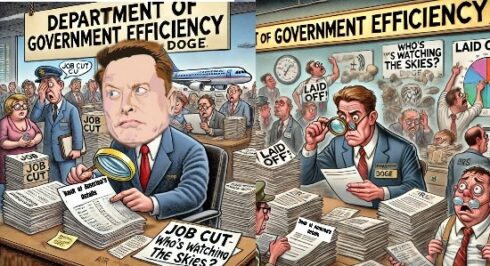The Department of Government Efficiency (DOGE), spearheaded by billionaire Elon Musk under the Trump administration, has made a controversial push for access to the Internal Revenue Service’s (IRS) Integrated Data Retrieval System (IDRS). This system contains highly sensitive taxpayer information, including tax filings and bank records. According to the White House, the purpose of this unprecedented access is to detect and eliminate waste, fraud, and abuse within government operations.
However, privacy advocates and lawmakers have raised serious concerns regarding the potential misuse of such data. Critics argue that allowing DOGE personnel access to taxpayer records could lead to significant breaches of financial privacy and violations of taxpayer rights. Reports indicate that the IRS is preparing a memorandum that would allow a billionaire, Elon Musk and DOGE engineer to work within its facilities, granting them access to the IDRS—a privilege typically restricted to select IRS employees. If approved, this move could set a precedent for future government interventions in personal financial data, escalating the ongoing debate over the balance between efficiency and privacy.
Elon Musk Influencing: FAA Mass Firings Amid Aviation Safety
Concerns
In a parallel and equally contentious development, the Trump administration has overseen the termination of hundreds of Federal Aviation Administration (FAA) employees, including engineers and technicians responsible for air traffic control safety. These mass layoffs come on the heels of a series of deadly aircraft crashes, including a midair collision over Washington, D.C., and fatal incidents in Philadelphia and Alaska.
The Professional Aviation Safety Specialists (PASS) union has strongly criticized the firings, emphasizing that the terminated employees played crucial roles in maintaining the safety of the nation’s aviation infrastructure. Aviation experts warn that reducing key personnel during a time of heightened safety concerns could have dire consequences for air travel security. While the administration argues that the cuts are part of a broader effort to curb government spending—led by DOGE—opposition from safety advocates and industry professionals continues to mount.
Elon Musk and Trumps’s Layoffs Extend to Multiple Federal Agencies
Beyond the FAA, the mass layoffs have impacted employees across more than a dozen federal agencies, including the Departments of Homeland Security, Veterans Affairs, and the Centers for Disease Control and Prevention (CDC). Government workers like Victoria, who was laid off from the U.S. Forest Service in Montana, have expressed devastation over the sudden job losses. “I built my whole life around this job,” she stated. “Elon Musk doesn’t even know my job exists, but we do a lot. I’m a public servant, and I do this job because I love it. Now, my entire community is suffering.”
Another former government worker, Elizabeth Anestheidge, who was employed at the Consumer Financial Protection Bureau, described the layoff process as disorganized and chaotic. She revealed that employees were left with so little information that many were unable to file for unemployment benefits. “We were just tossed out on the streets with no clear explanation,” she said, highlighting the turbulence surrounding the dismissals.
National Security Risks and Attempts to Reverse Layoffs
The impact of these layoffs has extended to critical sectors such as national security. Reports indicate that hundreds of workers at the National Nuclear Security Administration were also terminated, with sources claiming that some officials were unaware that these employees were responsible for managing the nation’s nuclear weapons systems. As the ramifications of the layoffs became apparent, federal officials scrambled to rehire some of the dismissed employees, acknowledging the security risks posed by the abrupt reductions in staff.
Despite these efforts, the damage may already be done. The rushed decision-making and lack of transparency in the layoffs have raised alarms about the administration’s approach to governance. Critics argue that while cost-cutting measures may be necessary, they should not come at the expense of public safety, national security, and financial privacy.
Public and Political Backlash Continues
The developments surrounding DOGE’s access to IRS data and the widespread federal layoffs have triggered a political and public backlash. Lawmakers from both parties have called for increased oversight of DOGE’s activities, questioning the long-term implications of such sweeping governmental changes. Meanwhile, affected workers and unions continue to demand answers and push for policy reversals that could reinstate critical jobs.
As these debates unfold, the core question remains: how far should government efficiency measures go before they compromise essential services, public trust, and individual rights? With the Trump administration and DOGE at the center of these controversies, the nation watches closely to see how these decisions will shape the future of governance and public service in the United States.














